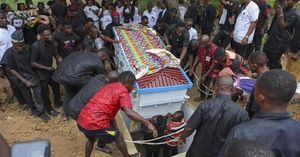Artur Pryakhin, the head of the Federal Antimonopoly Service for the Republic of Karelia, tragically died after falling from his office window on the afternoon of February 4, 2023. The incident occurred around noon at the administrative building located at Varkaus Embankment, 1A, Petrozavodsk. Witnesses reported discovering his body on the ground, which has since led to questions surrounding the circumstances of his death.
Pryakhin, aged 56, had been the head of the Federal Antimonopoly Service (UFAS) since January 2014 and was known for his extensive background in law enforcement. Before leading the UFAS, he served several years within the Interior Ministry, particularly focusing on combating economic crime. He had received numerous accolades throughout his career, including various medals and honors for his service and dedication to public administration.
According to preliminary information reported by various news outlets, including RTVI, there was no indication of foul play associated with his fall. Local authorities have opened investigations to establish the exact circumstances surrounding the tragic event. A political scientist, Anatoly Tsygankov, reflected on the incident, stating, "His death seems mysterious at the moment. He had a family, with a wife and an adult son; we express our condolences to them." He noted, "There were no complaints about his work; he constantly received gratitude and awards."">
Witness accounts indicate Pryakhin fell from the fifth floor of the UFAS building. The Investigative Committee of Karelia has confirmed the information about his death and has stated they are conducting procedural checks on the case without disclosing specific details of the investigation.
The loss of Pryakhin, who was reportedly well-respected within his community and profession, has raised concerns and condolences from those who knew him. He had built a notable career before taking the helm at the UFAS, drawing upon his experiences to combat monopolistic practices and enforce fair competition within the region.
Despite the tragic circumstances, many colleagues and officials have spoken highly of Pryakhin’s contributions. He was recognized multiple times for his work, receiving acknowledgments from higher government authorities, including both the Federal Antimonopoly Service and even the President of Russia, showcasing his prominent role and influence within the field.
Prior to his position with the UFAS, Pryakhin served at various levels within the law enforcement system. He was known for his role as the head of the Economic Crime Department with the Ministry of Internal Affairs of Karelia from 2010 to 2011 before retiring from service.
His professional history is underscored by several awards. Notably, he had received the Medal of the Federal Antimonopoly Service for "30 years of antimonopoly service" and was acknowledged as part of the leadership of the Academy #Leaders FAS program aimed at enhancing skills within public service administration.
The incident has shocked local officials and community members, leaving many to question how such a tragedy could occur. Blog posts and social media commentary reflect the gravity of this loss and the sense of disbelief among those who knew him. The community now looks toward the Investigative Committee as they seek clarity on whether this incident was the consequence of personal crises or other underlying factors.
Pryakhin's notable achievements, combined with the tragic nature of his passing, have drawn attention from various media outlets within Russia and the international community. This case invites scrutiny not only on the immediate circumstances of his death but also upon the broader challenges faced by public officials, especially those involved with rigorous anti-corruption and economic enforcement duties.
While the investigation progresses, many close to Pryakhin continue to mourn the loss of what they characterize as not only a professional colleague but also as friend and family man. Tributes and memorials can be expected, as those who valued his work and character reflect on his life and contributions to society.
The community's response has been one of solidarity, with calls for attention to the pressures and challenges faced by individuals working within high-stress government positions. This situation has prompted discussions around mental health resources and support systems for public servants.
Artur Pryakhin leaves behind not just memories of his professional achievements but also the impact he had on his family and friends, all of whom are grappling with the shock of this sudden loss.



